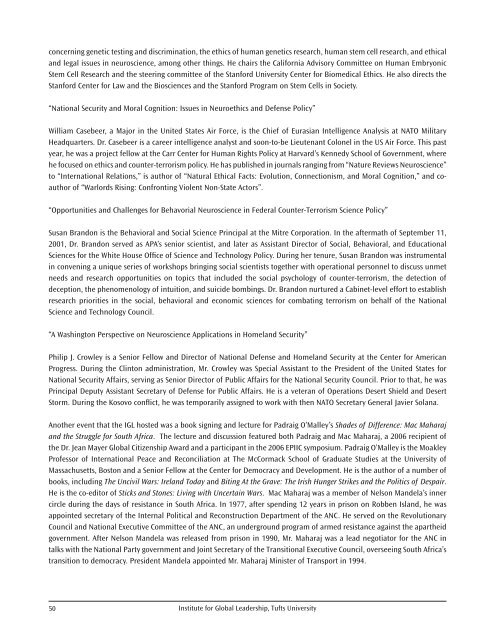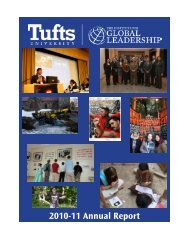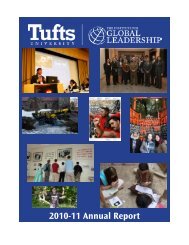Download - Institute for Global Leadership
Download - Institute for Global Leadership
Download - Institute for Global Leadership
You also want an ePaper? Increase the reach of your titles
YUMPU automatically turns print PDFs into web optimized ePapers that Google loves.
concerning genetic testing and discrimination, the ethics of human genetics research, human stem cell research, and ethical<br />
and legal issues in neuroscience, among other things. He chairs the Cali<strong>for</strong>nia Advisory Committee on Human Embryonic<br />
Stem Cell Research and the steering committee of the Stan<strong>for</strong>d University Center <strong>for</strong> Biomedical Ethics. He also directs the<br />
Stan<strong>for</strong>d Center <strong>for</strong> Law and the Biosciences and the Stan<strong>for</strong>d Program on Stem Cells in Society.<br />
“National Security and Moral Cognition: Issues in Neuroethics and Defense Policy”<br />
William Casebeer, a Major in the United States Air Force, is the Chief of Eurasian Intelligence Analysis at NATO Military<br />
Headquarters. Dr. Casebeer is a career intelligence analyst and soon-to-be Lieutenant Colonel in the US Air Force. This past<br />
year, he was a project fellow at the Carr Center <strong>for</strong> Human Rights Policy at Harvard’s Kennedy School of Government, where<br />
he focused on ethics and counter-terrorism policy. He has published in journals ranging from “Nature Reviews Neuroscience”<br />
to “International Relations,” is author of “Natural Ethical Facts: Evolution, Connectionism, and Moral Cognition,” and coauthor<br />
of “Warlords Rising: Confronting Violent Non-State Actors”.<br />
“Opportunities and Challenges <strong>for</strong> Behavorial Neuroscience in Federal Counter-Terrorism Science Policy”<br />
Susan Brandon is the Behavioral and Social Science Principal at the Mitre Corporation. In the aftermath of September 11,<br />
2001, Dr. Brandon served as APA’s senior scientist, and later as Assistant Director of Social, Behavioral, and Educational<br />
Sciences <strong>for</strong> the White House Office of Science and Technology Policy. During her tenure, Susan Brandon was instrumental<br />
in convening a unique series of workshops bringing social scientists together with operational personnel to discuss unmet<br />
needs and research opportunities on topics that included the social psychology of counter-terrorism, the detection of<br />
deception, the phenomenology of intuition, and suicide bombings. Dr. Brandon nurtured a Cabinet-level ef<strong>for</strong>t to establish<br />
research priorities in the social, behavioral and economic sciences <strong>for</strong> combating terrorism on behalf of the National<br />
Science and Technology Council.<br />
“A Washington Perspective on Neuroscience Applications in Homeland Security”<br />
Philip J. Crowley is a Senior Fellow and Director of National Defense and Homeland Security at the Center <strong>for</strong> American<br />
Progress. During the Clinton administration, Mr. Crowley was Special Assistant to the President of the United States <strong>for</strong><br />
National Security Affairs, serving as Senior Director of Public Affairs <strong>for</strong> the National Security Council. Prior to that, he was<br />
Principal Deputy Assistant Secretary of Defense <strong>for</strong> Public Affairs. He is a veteran of Operations Desert Shield and Desert<br />
Storm. During the Kosovo conflict, he was temporarily assigned to work with then NATO Secretary General Javier Solana.<br />
Another event that the IGL hosted was a book signing and lecture <strong>for</strong> Padraig O’Malley’s Shades of Difference: Mac Maharaj<br />
and the Struggle <strong>for</strong> South Africa. The lecture and discussion featured both Padraig and Mac Maharaj, a 2006 recipient of<br />
the Dr. Jean Mayer <strong>Global</strong> Citizenship Award and a participant in the 2006 EPIIC symposium. Padraig O’Malley is the Moakley<br />
Professor of International Peace and Reconciliation at The McCormack School of Graduate Studies at the University of<br />
Massachusetts, Boston and a Senior Fellow at the Center <strong>for</strong> Democracy and Development. He is the author of a number of<br />
books, including The Uncivil Wars: Ireland Today and Biting At the Grave: The Irish Hunger Strikes and the Politics of Despair.<br />
He is the co-editor of Sticks and Stones: Living with Uncertain Wars. Mac Maharaj was a member of Nelson Mandela’s inner<br />
circle during the days of resistance in South Africa. In 1977, after spending 12 years in prison on Robben Island, he was<br />
appointed secretary of the Internal Political and Reconstruction Department of the ANC. He served on the Revolutionary<br />
Council and National Executive Committee of the ANC, an underground program of armed resistance against the apartheid<br />
government. After Nelson Mandela was released from prison in 1990, Mr. Maharaj was a lead negotiator <strong>for</strong> the ANC in<br />
talks with the National Party government and Joint Secretary of the Transitional Executive Council, overseeing South Africa’s<br />
transition to democracy. President Mandela appointed Mr. Maharaj Minister of Transport in 1994.<br />
50<br />
<strong>Institute</strong> <strong>for</strong> <strong>Global</strong> <strong>Leadership</strong>, Tufts University






